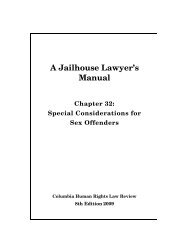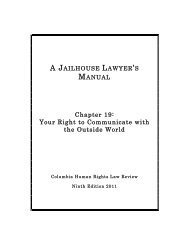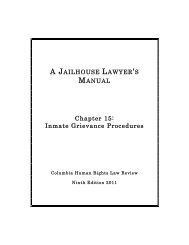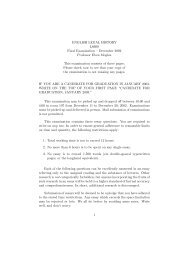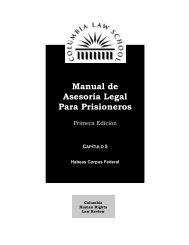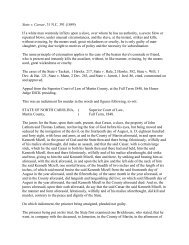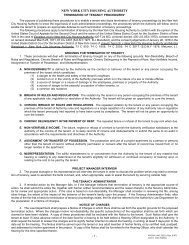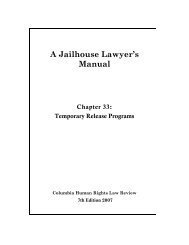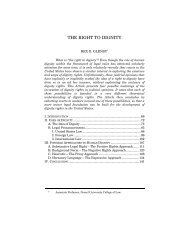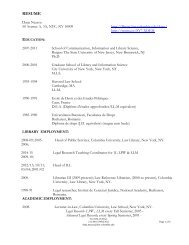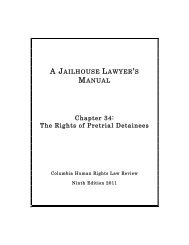A Right to Media? Lorie M. Graham - Columbia Law School
A Right to Media? Lorie M. Graham - Columbia Law School
A Right to Media? Lorie M. Graham - Columbia Law School
You also want an ePaper? Increase the reach of your titles
YUMPU automatically turns print PDFs into web optimized ePapers that Google loves.
2010] A RIGHT TO MEDIA? 443<br />
In further explaining the scope of these rights, the Special<br />
Rapporteur on the Promotion and Protection of the <strong>Right</strong> <strong>to</strong> Freedom<br />
of Opinion and Expression has stated that freedom of expression is:<br />
[B]oth a civil right, in its capacity of protecting this sphere<br />
of life of the individual against undue infringements of the<br />
State, and a political right, in its capacity of guaranteeing<br />
the participation of the individual in political life, including<br />
that of State institutions. As such, the right <strong>to</strong> freedom of<br />
expression can be described as an essential test right, the<br />
enjoyment of which illustrates the degree of enjoyment of<br />
all human rights enshrined in the United Nations Bill of<br />
<strong>Right</strong>s. 46<br />
All peoples and marginalized populations in particular,<br />
require the protections provided by the right <strong>to</strong> freedom of expression<br />
in order <strong>to</strong> participate in political, civil, cultural, and economic<br />
development. His<strong>to</strong>rically, state infringement of indigenous peoples’<br />
freedom of expression has prevented them from enjoying such<br />
development. Moreover, state actions which circumscribe a peoples’<br />
ability <strong>to</strong> communicate and share ideas and news, such as<br />
destruction of language through subtractive education, strike at the<br />
heart of both civil and political rights.<br />
The Special Rapporteur has similarly highlighted the<br />
linkages between freedom of expression and the right <strong>to</strong> information,<br />
by stating that “because of the social and political role of information,<br />
the right of everyone <strong>to</strong> receive information and ideas has <strong>to</strong> be<br />
carefully protected . . . [as] this is not simply a converse of the right<br />
<strong>to</strong> impart information but it is a freedom in its own right.” 47<br />
Thus, the right <strong>to</strong> information is central <strong>to</strong> the concept of<br />
freedom of expression, but stands alone as its own important right. 48<br />
freedom of information. Resolution 59(I) stated in part: “Freedom of information<br />
is a fundamental human right and is the <strong>to</strong>uchs<strong>to</strong>ne of all freedoms <strong>to</strong> which the<br />
United Nations is consecrated. Freedom of information implies the right <strong>to</strong><br />
gather, transmit, and publish news anywhere and everywhere without fetters. As<br />
such it is an essential fac<strong>to</strong>r in any serious effort <strong>to</strong> promote the peace and<br />
progress of the world. Freedom of information requires as an indispensable<br />
element the willingness and capacity <strong>to</strong> employ its privileges without abuse. It<br />
requires as a basic discipline the moral obligation <strong>to</strong> seek the facts without<br />
prejudice and <strong>to</strong> spread knowledge without malicious intent.” G.A. Res. 59 (I), at<br />
95, U.N. Doc. A/RES/1/59 (Dec. 14, 1946).<br />
46. Human <strong>Right</strong>s During Imprisonment, supra note 25, para. 14.<br />
47. Id. paras. 34–35.<br />
48. The focus of this Article is on the right <strong>to</strong> information and the distinct<br />
but related right <strong>to</strong> freedom of expression, both of which are component parts of a



